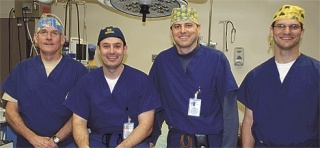Naval Hospital, Oak Harbor, is providing patients with “the professional quality they expect and the personal care they deserve,” which is the theme of this year’s National Nurse Anesthetists Week.
The special week will be celebrated Jan. 25 to 31 by Certified Registered Nurse Anesthetists (CRNAs) in Oak Harbor and across the country.
Established by the American Association of Nurse Anesthetists, National Nurse and Anesthetists Week was created to encourage CRNAs to take the opportunity to educate the public about anesthesia safety, questions to ask prior to undergoing surgery, and the benefits of receiving anesthesia care from nurse anesthetists.
“One of the many rewards of being a nurse anesthetist is providing patients with the comfort of knowing that I will be by their side monitoring their vital signs and adjusting their anesthetics during the entire time they are asleep, a fact many patients are unaware of,” said Cmdr. Craig Cooper, Chief Nurse Anesthetist, Naval Hospital Oak Harbor, in a news release. “National Nurse Anesthetists Week serves as an opportunity to promote exactly what CRNAs do and who we are.”
Nurse anesthetists are advanced practice nurses who administer approximately 30 million anesthetics in the United States each year. Practicing in every setting where anesthesia is available, CRNAs are the sole anesthesia providers in more than two-thirds of all rural hospitals, and have been the main provider of anesthesia care to U.S. service men and women on the front lines since World War I.
“I take pride in belonging to a profession that has been at the forefront of anesthesia patient safety for more than 125 a years. CRNAs play a key role in developing trends related to monitoring technology, anesthetic drugs, and provider education. In fact, anesthesia today is nearly 50 times safer than it was just 20 years ago,” said Cooper.
Founded in 1931, the AANA is the professional organization for more than 39,000 nurse anesthetists throughout the nation. Visit www.aana.com.



